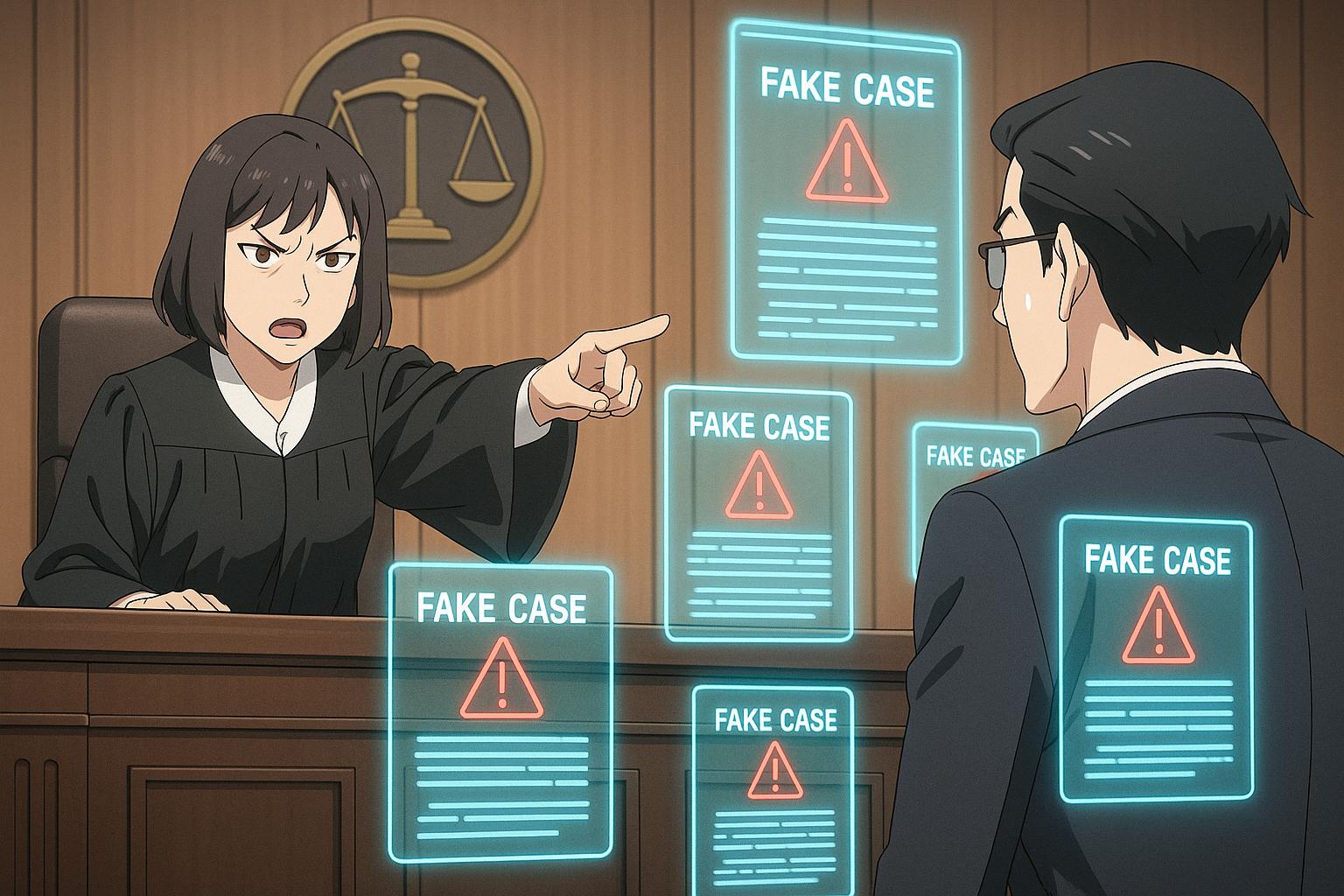High Court Justice Victoria Sharp warns legal professionals that citing fictitious cases produced by AI without proper verification risks prosecution and threatens public confidence in the UK justice system.
The recent misuse of artificial intelligence (AI) in court cases within the UK has raised alarms regarding the integrity of the legal system. High Court Justice Victoria Sharp has issued a stark warning that lawyers who cite fictitious cases generated by AI without thorough checks could face prosecution. In a ruling delivered on Friday, she remarked on the “serious implications for the administration of justice and public confidence in the justice system,” following recent examples that exposed the vulnerabilities associated with unchecked AI use in legal proceedings.
In one prominent case involving a £90 million lawsuit against Qatar National Bank, a lawyer cited 18 entirely fabricated legal cases, relying chiefly on information from the client, Hamad Al-Haroun, rather than conducting independent legal research. Al-Haroun, acknowledging his role in misleading the court, emphasised that the final responsibility lay with his solicitor, Abid Hussain. Justice Sharp was incredulous, stating it was “extraordinary” that a lawyer would depend on a client for the accuracy of legal research, which traditionally relies on the expertise of trained individuals.
A second case underscored similar concerns when barrister Sarah Forey referenced five non-existent cases in a housing claim against the London Borough of Haringey. While Forey denied employing AI tools, Sharp noted that she failed to provide a coherent explanation for the inaccuracies, condemning the reliance on dubious material within court submissions. Both cases have been referred to professional regulators, highlighting the legal profession’s obligation to uphold standards of accuracy and integrity.
The gravity of these incidents raises questions about the broader implications of AI in legal contexts. Sharp warned that submitting material that is knowingly false could constitute contempt of court or, in the most severe instances, perverting the course of justice, an offence that carries a maximum penalty of life imprisonment. The judges stressed that while AI can be a powerful and beneficial tool in the legal sphere, its adoption must be regulated properly to maintain public confidence.
This gathering concern echoes similar cases worldwide, where judicial frameworks are increasingly challenged by the rapid proliferation of AI technologies. For instance, in the United States, a New York law firm faced penalties when its lawyers submitted fake citations generated by ChatGPT. The firm experienced backlash for neglecting their responsibilities to ensure the accuracy of their legal citations, a trend that has sparked discussion on the ethical implications of using AI in legal practices.
Moreover, this incident in the UK has drawn commentary from legal experts, such as Adam Wagner KC of Doughty Street Chambers, who noted that while the court did not definitively attribute the creation of the fake cases to AI, the possibility remains strong. The legal community faces a crucial imperative: how to effectively integrate AI into their practices without sacrificing legal integrity.
Justice Sharp concluded that the technology must be employed with significant oversight and within a framework that adheres to established ethical standards to ensure public trust in the justice system remains intact. The resonating message is clear: as AI becomes more interwoven into legal processes, vigilance and adherence to professional standards will be essential to safeguard the integrity of the judiciary.
 Reference Map:
Reference Map:
- Paragraph 1 – [1], [2]
- Paragraph 2 – [1], [2], [3]
- Paragraph 3 – [2], [3], [4]
- Paragraph 4 – [3], [5], [6]
- Paragraph 5 – [3], [6]
- Paragraph 6 – [1], [4]
Source: Noah Wire Services
- https://www.whec.com/ap-top-news/uk-judge-warns-of-risk-to-justice-after-lawyers-cited-fake-ai-generated-cases-in-court/ – Please view link – unable to able to access data
- https://apnews.com/article/46013a78d78dc869bdfd6b42579411cb – A UK High Court judge has warned about the risk to the justice system after lawyers cited fake legal cases generated by artificial intelligence (AI) in court. Justice Victoria Sharp noted the serious implications of such misuse for public trust and legal integrity. In one case involving a £90 million lawsuit with Qatar National Bank, a lawyer cited 18 non-existent cases generated by AI, relying on the client, Hamad Al-Haroun, for legal research. In another case, barrister Sarah Forey referenced five fictitious cases in a housing claim. Though Forey denied using AI, she failed to provide a clear explanation. The judges, including Jeremy Johnson, referred both attorneys to professional regulators. Sharp emphasized that knowingly presenting false information could lead to contempt of court or, in severe cases, charges such as perverting the course of justice—an offense punishable by life imprisonment. She acknowledged AI as a powerful and useful legal tool but stressed the importance of accurate oversight and adherence to ethical standards to maintain public confidence in the justice system.
- https://www.reuters.com/world/uk/lawyers-face-sanctions-citing-fake-cases-with-ai-warns-uk-judge-2025-06-06/ – A senior UK judge has issued a stern warning to lawyers using artificial intelligence (AI) to cite non-existent legal cases, highlighting the potential for severe consequences including contempt of court and criminal charges. The warning follows two recent cases in London’s High Court where lawyers appeared to have relied on AI tools such as ChatGPT to generate supporting arguments based on fictitious case law. Judge Victoria Sharp emphasized the serious threat this misuse of AI poses to the integrity of the justice system and public confidence in legal proceedings. She called upon legal regulators and industry leaders to implement more effective measures to ensure lawyers recognize and uphold their ethical duties. While existing guidance on AI use exists, Sharp stressed it is not sufficient to curb misuse. In extreme instances, submitting deliberately false material to court could constitute the criminal offense of perverting the course of justice. This ruling adds to global concerns about the rapid adoption of generative AI in legal practice without adequate oversight.
- https://www.legalcheek.com/2025/05/judge-fury-after-fake-cases-cited-by-rookie-barrister-in-high-court/ – A High Court judge has issued a scathing ruling after multiple fictitious legal authorities were included in court submissions. The case concerned a homeless claimant seeking accommodation from Haringey council. Things took a sharp turn when the defendant discovered five ‘made-up’ cases in the claimant’s submissions. Although the judge could not rule on whether artificial intelligence (AI) had been used by the lawyers for the claimant, who had not been sworn or cross-examined, he also left little doubt about the seriousness of the lapse, stating: ‘These were not cosmetic errors, they were substantive fakes and no proper explanation has been given for putting them into a pleading,’ said Mr Justice Ritchie, adding: ‘I have a substantial difficulty with members of the Bar who put fake cases in statements of facts and grounds.’ He added: ‘On the balance of probabilities, I consider that it would have been negligent for this barrister, if she used AI and did not check it, to put that text into her pleading. However, I am not in a position to determine whether she did use AI. I find as a fact that Ms Forey intentionally put these cases into her statement of facts and grounds, not caring whether they existed or not, because she had got them from a source which I do not know but certainly was not photocopying cases, putting them in a box and tabulating them, and certainly not from any law report. I do not accept that it is possible to photocopy a non-existent case and tabulate it.’ The 2025 Legal Cheek Chambers Most List Judge Ritchie found that the junior barrister in question, Sarah Forey of 3 Bolt Court Chambers, instructed by Haringey Law Centre solicitors, had acted improperly, unreasonably and negligently. He ordered both Forey and the solicitors to personally pay £2,000 each to Haringey Council’s legal costs. Certainly the judge’s warning will echo across the profession: ‘It would have been negligent for this barrister, if she used AI and did not check it, to put that text into her pleading.’ This case has sparked discussion on social media. Writing on LinkedIn, Adam Wagner KC of Doughty Street Chambers commented on the judgment, noting that while the court didn’t confirm AI was responsible for the fake cases, ‘it seems a very reasonable possibility.’
- https://www.legalfutures.co.uk/latest-news/court-fines-us-lawyers-who-cited-fake-cases-produced-by-chatgpt – A New York law firm has been fined for submitting fake court citations generated by ChatGPT. The case involved a lawyer who admitted to using ChatGPT to help write court filings that cited six nonexistent cases invented by the artificial intelligence tool. The lawyer, Steven Schwartz, of the firm Levidow, Levidow, & Oberman, greatly regretted having utilized generative artificial intelligence to supplement the legal research performed and stated he would never do so in the future without absolute verification of its authenticity. The firm acknowledged the mistake and arranged for outside counsel to conduct mandatory training on technological competence and artificial intelligence. Judge P. Kevin Castel noted that the lawyers and their firm abandoned their responsibilities when they submitted nonexistent judicial opinions with fake quotes and citations created by ChatGPT, then continued to stand by the fake opinions after judicial orders called their existence into question. The fines were deemed sufficient to advance the goals of specific and general deterrence.
- https://www.theguardian.com/technology/2023/jun/23/two-us-lawyers-fined-submitting-fake-court-citations-chatgpt – Two US lawyers have been fined for submitting fake court citations generated by ChatGPT. The judge, P. Kevin Castel, stated that there was nothing inherently improper about using artificial intelligence for assisting in legal work, but lawyers had to ensure their filings were accurate. The judge noted that the lawyers and their firm abandoned their responsibilities when they submitted nonexistent judicial opinions with fake quotes and citations created by ChatGPT, then continued to stand by the fake opinions after judicial orders called their existence into question. The law firm, Levidow, Levidow & Oberman, stated that they respectfully disagreed with the court that they had acted in bad faith and that they made a good-faith mistake in failing to believe that a piece of technology could be making up cases out of whole cloth.
- https://www.independent.co.uk/news/uk/home-news/chatgot-woman-court-case-ai-b2462142.html – A woman who used nine ‘fabricated’ AI cases in court has lost her appeal. Felicity Harber was charged £3,265 after she failed to pay tax on a property she sold. She appeared in court to appeal the decision and cited cases which the court found were ‘fabrications’ and had been generated by artificial intelligence such as ChatGPT. She was asked whether AI had been used and confirmed it was ‘possible’. When confronted with the reality, Mrs. Harber told the court that she ‘couldn’t see it made any difference’ if AI had been used as she was confident there would be cases where mental health or ignorance of the law were a reasonable excuse in her defence. The tribunal informed Mrs. Harber that cases were publicly listed along with their judgments on case law websites, which she said she had not been aware of. Judge Anne Redston said that the use of artificial intelligence in court was a ‘serious and important issue’.
Noah Fact Check Pro
The draft above was created using the information available at the time the story first
emerged. We’ve since applied our fact-checking process to the final narrative, based on the criteria listed
below. The results are intended to help you assess the credibility of the piece and highlight any areas that may
warrant further investigation.
Freshness check
Score:
10
Notes:
The narrative is current, with the earliest known publication date being June 7, 2025. It has not appeared elsewhere prior to this date. The report is based on a recent ruling by High Court Justice Victoria Sharp, highlighting the misuse of AI in legal proceedings. This is a fresh development, with no evidence of recycled content. The inclusion of updated data and specific case details suggests a high freshness score.
Quotes check
Score:
10
Notes:
The direct quotes from Justice Victoria Sharp and other individuals are unique to this report. No identical quotes have been found in earlier material, indicating original or exclusive content. The wording of the quotes matches the context and tone of the report, with no variations or discrepancies noted.
Source reliability
Score:
8
Notes:
The narrative originates from the Associated Press (AP), a reputable news organisation known for its journalistic standards. However, the report is hosted on WHEC.com, a local news outlet. While WHEC is a legitimate source, it is not as widely recognised as AP. The content appears to be a direct reproduction of the AP report, with no significant alterations or additions.
Plausability check
Score:
10
Notes:
The claims made in the narrative are plausible and align with known issues regarding the misuse of AI in legal contexts. Similar incidents have been reported globally, such as the case involving a New York law firm facing penalties for submitting fake citations generated by ChatGPT. The narrative provides specific details, including the involvement of Justice Victoria Sharp and the referral of lawyers to professional regulators, which are consistent with other reputable sources. The language and tone are appropriate for the subject matter, and there are no signs of excessive or off-topic detail.
Overall assessment
Verdict (FAIL, OPEN, PASS): PASS
Confidence (LOW, MEDIUM, HIGH): HIGH
Summary:
The narrative is fresh, original, and sourced from a reputable organisation, with plausible claims supported by specific details. There are no significant credibility risks identified.













